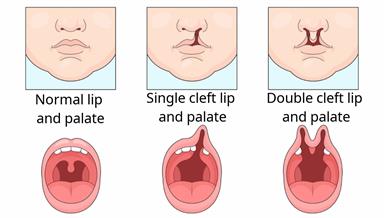ThisisPatientEngagementcontent
Cleft Lip and Cleft Palate, Pediatric
Learn more about our Patient Engagement products now! Turn your patients into active participants in their healthcare by giving them easy access to the same evidence-based information you trust – but delivered in an easy-to-understand format.

Some babies are born with a small opening in their lip or the roof of their mouth. This is called a cleft lip or a cleft palate.
A cleft lip is a gap or split in the top lip. The cleft may be on one side of the face or both sides. A cleft palate is an opening in the roof of the mouth.
A baby can be born with a cleft lip, a cleft palate, or both.
 The cause of a cleft lip or cleft palate may not be known. When a baby is growing in the uterus, the lip and the roof of the mouth are supposed to come together like puzzle pieces. If they don't join all the way, a cleft can happen.
The cause of a cleft lip or cleft palate may not be known. When a baby is growing in the uterus, the lip and the roof of the mouth are supposed to come together like puzzle pieces. If they don't join all the way, a cleft can happen.If the cleft lip and cleft palate are part of a syndrome, your baby may have other health problems too.
A cleft lip and palate may be found during an ultrasound before birth. They may also be diagnosed at birth or during a physical exam shortly after birth.
The repair will make it easier for your baby to eat and breathe. Depending on your baby's condition, your baby may have some treatments before 6 months of age, then other treatments when they're older. Some children may need more surgeries later in life.
Even though repairing the cleft will help with speech, language, and hearing development, your baby's health care team may also have specialists in these areas.
Feeding
Babies with a cleft lip or palate may have trouble getting a good seal on the breast or closing their mouth well on a bottle. If your baby has a cleft palate, eating may be a little harder if held a certain way. You and your baby's health care team will work together to find the best way to feed your baby.General instructions
If you can't reach the provider, go to an urgent care or emergency room.
These symptoms may be an emergency. Do not wait to see if the symptoms will go away. Call 911 right away.
This information is not intended to replace advice given to you by your health care provider. Make sure you discuss any questions you have with your health care provider.
Cookies are used by this site. To decline or learn more, visit our cookie notice.
Copyright © 2025 Elsevier, its licensors, and contributors. All rights are reserved, including those for text and data mining, AI training, and similar technologies.